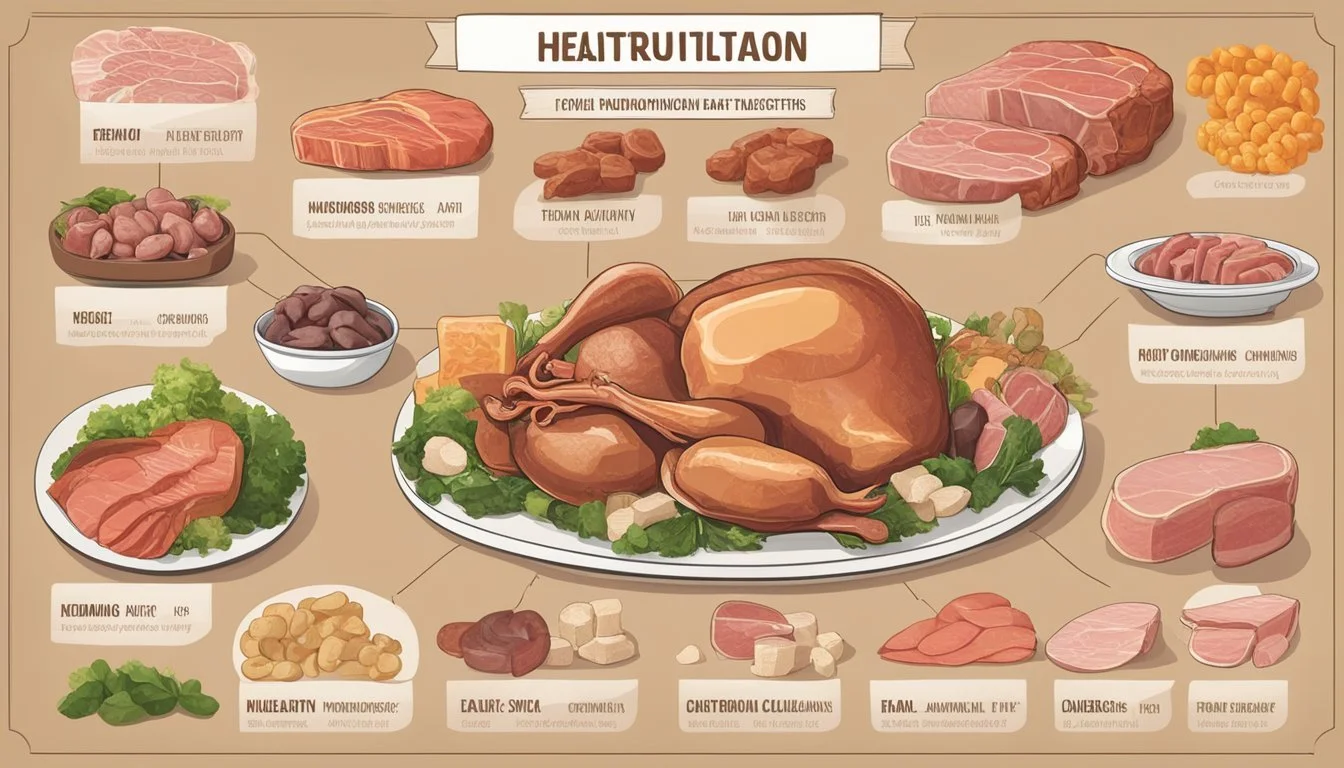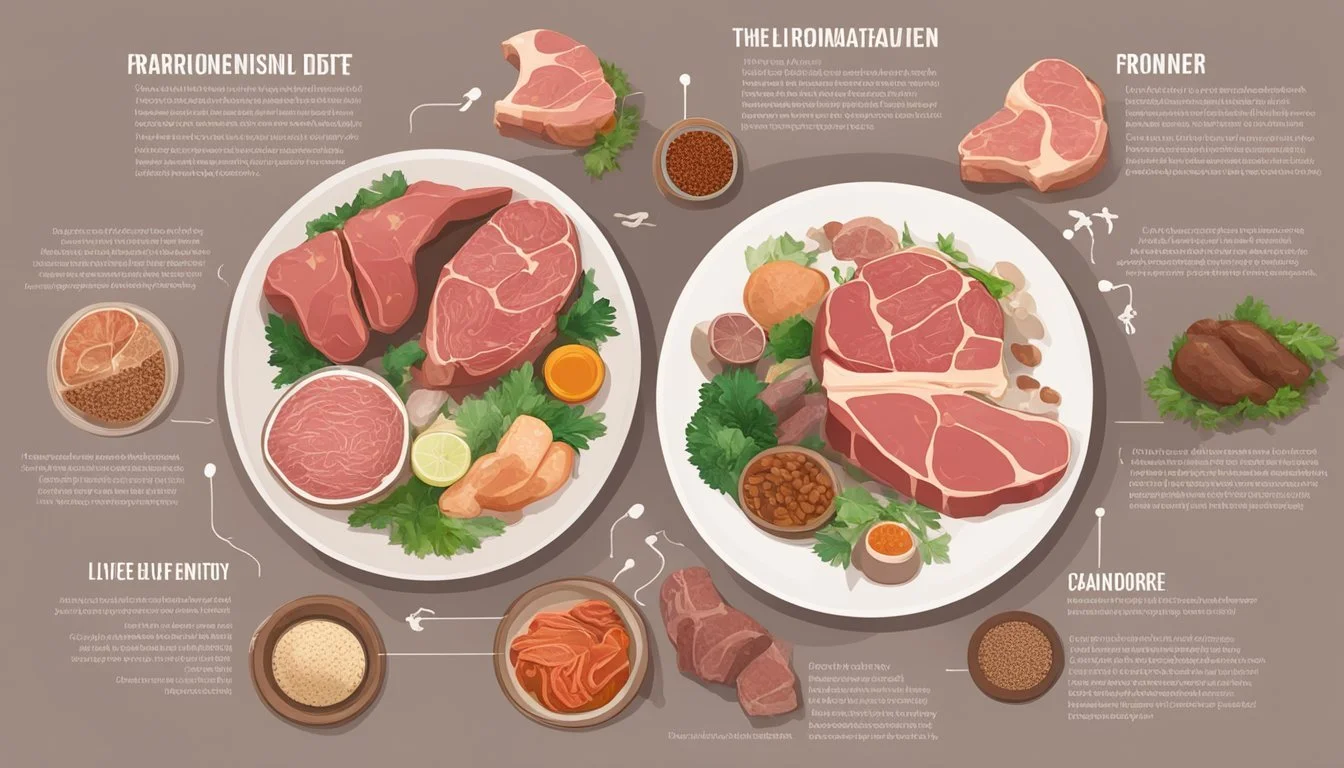Carnivore Diet and Promoting Healthy Liver Function
Essential Insights and Tips
The carnivore diet, consisting exclusively of animal products, has gained attention for its potential impact on health, including liver function. It is a dietary regimen that involves eating primarily meat, fish, eggs, and select dairy products, while eliminating all plant-based foods. Advocates suggest that this diet offers various health benefits, such as weight loss and reduced inflammation, due to its low carbohydrate content and high protein intake. The liver, a vital organ with key roles in metabolism, detoxification, and nutrient storage, may experience changes under the sharply distinct nutrient profile the carnivore diet presents.
Nutrition is a cornerstone of liver health, and the carnivore diet provides a substantial intake of certain nutrients that are fundamental for the liver's repair and function. An ample supply of dietary protein, for instance, contributes to the regeneration of liver cells, essential for maintaining the integrity of liver function. Additionally, by incorporating liver as part of the diet, individuals can obtain a high concentration of vitamin A, vital for various bodily functions, including those of the immune system and vision.
However, the long-term effects of a carnivore diet on liver health remain a subject of ongoing discussion among experts. The absence of fruits, vegetables, grains, and legumes raises questions regarding the potential risks and benefits, considering these plant-based foods are traditional sources of antioxidants and other compounds supportive of liver health. Notwithstanding its popularity, a balance of nutrients is crucial to liver function, and the carnivore diet's departure from conventionally diverse food intake requires careful consideration and further research to fully understand its implications on the liver.
Understanding the Carnivore Diet
This section provides a detailed examination of the carnivore diet, exploring its definition, comparison with other dietary approaches, and its historical relevance in human culture.
Defining the Carnivore Diet
The carnivore diet is characterized by the exclusive consumption of animal products. Individuals on this diet typically consume a variety of meat including beef, lamb, pork, and seafood, as well as eggs, organ meat like liver, and select dairy products such as milk, cream, and butter. It eschews all plant-based foods, meaning no vegetables, grains, fruit, nuts, seeds, or legumes. The diet is considered high-protein and animal-based, focusing on nutrient-dense foods to provide energy, vitamins, and minerals.
Comparison with Other Diets
Unlike more diverse dietary plans, the carnivore diet eliminates the inclusion of plant-based foods which provide a variety of nutrients. It stands in stark contrast to diets like the Mediterranean or vegan diets, which incorporate a wide range of plant foods. The absence of fruits, vegetables, grains, and legumes means those following a carnivore diet obtain nutrients solely from animal sources, which can provide a complete profile of essential amino acids and other nutrients while being low in dietary fibers.
Historical and Cultural Context of Meat Consumption
Historically, the human diet has varied greatly across cultures and periods. There are instances where communities have thrived on mostly meat-based diets, particularly in regions where agriculture was not feasible. Cultures in the Arctic, such as the Inuit, traditionally consumed a diet high in animal products due to the scarcity of plant foods. Meat consumption, particularly that of organ meat, has also been central to many cultures for its nutrient-dense properties, providing essential vitamins and minerals. In various societies, the dietary preference for meat has often symbolized affluence and societal status.
Nutritional Profile of the Carnivore Diet
The Carnivore Diet is distinctly characterized by its exclusive consumption of animal products, focusing on meat, which is a rich source of protein and various micronutrients essential for the body.
Macronutrients and Micronutrients
The diet predominantly comprises proteins and fats, with meats like chicken, beef, pork, and fish serving as staple foods. These animal products are naturally high in B vitamins, iron, zinc, and essential amino acids. Unlike most diets, the carbohydrates are minimal to nonexistent due to the absence of plant-based foods. Consequently, the body shifts to utilizing fats and proteins for energy.
Proteins: Essential for muscle repair and enzyme functions; provided by meats and eggs.
Fats: Sourced from meats, eggs, and dairy; vital for energy and cell membranes.
Potential Nutrient Deficiencies
While the Carnivore Diet is rich in certain nutrients, the exclusion of plant-based foods raises concerns about potential deficiencies. Vital nutrients commonly underrepresented include vitamin C, fiber, and some phytonutrients. Vitamins and minerals predominantly found in fruits and vegetables may need to be monitored to maintain proper health.
Vitamin C: Mostly found in fruits and vegetables; necessary for collagen synthesis and immune function.
Fiber: Absent in animal products; important for digestive health.
I highly recommend purchasing vitamin C and fiber supplement online for a convenient shopping experience!
The Role of Organ Meats
Organ meats, such as liver and kidneys, play a significant role in enhancing the nutritional completeness of the Carnivore Diet. These organ meats are dense in micronutrients, including vitamin A, B vitamins, iron, and zinc. Incorporating organ meats into the diet can help mitigate some of the potential nutrient gaps, especially for nutrients that are scarce in muscle meats.
Liver: High in vitamin A, B vitamins, and iron; liver is often described as nature's multivitamin.
Kidneys: Rich in B vitamins and minerals; supports metabolic processes.
Balancing Fats and Proteins
For liver health and overall metabolic function, the balance between fats and proteins is crucial. Selecting a variety of meat sources, including both lean and fatty cuts, can provide a well-rounded intake of saturated and unsaturated fats. This ensures that while the liver processes fats for energy due to the limited carbohydrate intake, there is no excessive strain from disproportionate fat consumption.
Lean meats: Source of protein with lower fat content; include chicken breasts and lean cuts of beef.
Fatty meats: Include ribeye and bacon; provide a source of essential fatty acids and energy.
By focusing on a rich variety of animal products, including eggs, dairy, and especially organ meats, individuals can obtain a broad spectrum of the nutrients required for healthy bodily functions. However, attention should be paid to the potential for nutrient deficiencies, specifically those typically found in plant-based foods.
Carnivore Diet and Liver Health
The carnivore diet's influence on liver health is multifaceted, affecting liver function and metabolism, enzyme levels, and potentially the management of fatty liver disease.
Liver Function and Metabolism
The liver is central to detoxification, metabolism, and nutrient storage within the body. On a carnivore diet, which excludes plant-based foods, liver intake is often increased. A serving of liver provides a significant amount of vitamin A, which is crucial for various bodily functions including maintaining healthy liver function. The diet's high-protein content, primarily from animal sources, requires the liver to engage in gluconeogenesis, a metabolic pathway that results in glucose production from non-carbohydrate substrates.
Impact on Liver Enzyme Levels
Liver enzyme levels, such as alanine transaminase (ALT) and aspartate transaminase (AST), are key indicators of liver health. Elevated levels can signal liver damage or stress. Some reports indicate that meat-heavy diets, like the carnivore diet, can affect these enzyme levels. Conversely, fatty fish, a component of some carnivore diets, contains omega-3 fatty acids, which have been correlated with maintaining normal liver enzyme levels.
Normal Range for Liver Enzymes:
ALT: 7 to 56 units per liter of serum
AST: 10 to 40 units per liter of serum
It is crucial for individuals with a pre-existing liver condition to monitor these levels closely, as significant dietary changes may impact liver health.
Preventing and Addressing Fatty Liver Disease
Non-alcoholic fatty liver disease (NAFLD) is characterized by excess fat build-up in the liver. While the carnivore diet eliminates carbohydrate and sugar intake, which are contributing factors to NAFLD, its high saturated fat content could pose risks. Certain interpretations of the carnivore diet that prioritize lean meats and include fatty fish might help in reducing liver fat content. However, any dietary approach to tackling fatty liver disease should be discussed with a healthcare provider, especially for those with a pre-existing liver condition or liver damage.
Weight Management and the Carnivore Diet
This section examines how the Carnivore Diet may influence weight loss, impact blood sugar levels, and induce ketosis.
Weight Loss and Body Composition
The Carnivore Diet tends to be high in protein and low in carbohydrates, which can influence body composition. Consuming protein-rich foods such as beef, chicken, and cheese may increase satiety and reduce overall calorie intake. Ground beef, for instance, is a staple of the Carnivore Diet and provides a substantial amount of protein that may aid in muscle retention during weight loss.
Effects on Blood Sugar and Diabetes Risk
By eliminating carbohydrates, the Carnivore Diet can have a significant effect on blood sugar levels. Since there is no intake of carbohydrates, foods like bread, pasta, and sugary snacks that typically spike glucose levels are absent. This can lead to more stable blood sugar levels, which might be beneficial for individuals at risk of diabetes. However, balancing this diet with concerns for complete nutrition is essential.
Carnivore Diet and Ketosis
With the absence of carbohydrates, the body may enter a state of ketosis, where it begins to burn fat for energy. This process can be triggered on the Carnivore Diet as the intake of carbs is extremely low, and the body turns to other sources like body fat for generating energy. This metabolic state is also common in a keto or other low-carb diet and may contribute to weight loss and increased energy levels.
Addressing Common Concerns
This section dissects prevalent hesitations surrounding the carnivore diet, particularly focusing on inflammation, heart disease, digestive health, and the balance of sodium and saturated fat.
Risk of Inflammation and Heart Disease
The carnivore diet emphasizes the consumption of animal products, including red meat, which is a source of saturated fats. Critics often link high intakes of red meat and saturated fats to an increased risk of heart disease and inflammation. To address these concerns:
Inflammation: Meat, especially when overcooked or processed, can contain compounds that may contribute to inflammation.
Heart Disease: The intake of saturated fats found in meat has been traditionally associated with higher LDL cholesterol, a risk factor for heart disease.
It's important to note that some studies posit potential benefits in the context of inflammation markers improving for some individuals on a carnivore diet.
Considerations for Digestive Health
A carnivore diet lacks fiber, a key element typically found in plant-based foods and crucial for maintaining digestive health. Without fiber, individuals may experience:
Constipation: A common side effect due to lack of fiber.
Colon Health: Long-term absence of fiber may pose risks, such as an increased chance of developing colon cancer.
Drinking adequate water can help mitigate some digestive issues, but the long-term effects on digestive health without fiber are a consideration that requires further research.
Balancing Sodium and Saturated Fat Intake
A carnivore diet can lead to increased consumption of sodium and saturated fats, both of which are important to balance for overall health.
Sodium: Overconsumption of salt, often found in processed meats, can lead to higher blood pressure and associated health risks.
Saturated Fats: While some saturated fat is necessary, excess intake may be detrimental.
Monitor saturated fat with lean meats and watch sodium by choosing fresh, unprocessed options:
Saturated Fat: Monitor intake; opt for leaner cuts of meat.
Sodium: Be cautious of salt intake; choose fresh, unprocessed meats.
Moderation and carefully selecting meat sources can mitigate some risks, while ensuring a more balanced approach to this diet.
Lifestyle and Composition of Carnivore Diet
The carnivore diet emphasizes a strict regimen of animal-based foods aimed at optimizing health, which proponents say can improve liver function. Key facets of this lifestyle include careful meal planning, regular physical activity, and consideration of sustainability practices, as well as engaging with supportive communities.
Daily Meal Planning
On a carnivore diet, individuals typically consume meat, fish, eggs, and certain dairy products.
Breakfast might be comprised of scrambled eggs, bacon, and a side of beef liver for its high nutrient density.
Lunch could include a turkey burger or a portion of seafood such as salmon or shrimp to provide healthy omega-3 fatty acids.
Dinner may involve a variety of meats like a ribeye steak (What wine goes well with ribeye steak?) or a lamb chop, focusing on the inclusion of different flavors and textures to maintain meal satisfaction.
Incorporating Physical Activity
Physical activity is vital in tandem with the carnivore diet to maintain energy levels and support the immune system. Exercise routines should be balanced, incorporating both cardiovascular and strength training exercises. Regular activity is not only beneficial for metabolic health but also complements the high-protein nature of the diet to aid muscle recovery and growth.
Sustainability and Ethical Considerations
While the carnivore diet is animal-centric, individuals often consider the sourcing of meats such as grass-fed beef or pasture-raised poultry. Selecting fish and seafood from sustainable stocks is also a concern addressed by many on the diet. Ethical implications guide choices towards producers with humane practices and minimal environmental impact.
Community and Support Networks
Support networks are essential for those adopting the carnivore diet lifestyle. Online communities and local groups provide platforms where individuals can share experiences, recipes that bring out the natural flavor of meats, and tips on how to sustain high energy levels. Moreover, these networks offer guidance on navigating the diet with respect to individual health goals and advice on supporting the immune system through nutrient-rich animal products such as beef liver.
Optimizing Nutrition on a Carnivore Diet
To maintain optimal health on a carnivore diet, one must carefully consider nutrient intake, hydration, quality of meat and seafood, and the use of herbs and seasonings to ensure nutrient needs are met without plant-based foods.
Supplementation Strategies
On a carnivore diet, there's potential for certain nutrient deficiencies, especially if only muscle meats are consumed. Including organ meats like liver can provide a natural source of vitamins A, D, E, and K, along with a range of B vitamins, and minerals such as iron, zinc, and copper. Supplementation may be necessary for nutrients predominantly found in plant foods, such as Vitamin C and fiber. It's vital to consider supplements that are free from non-carnivore additives.
Hydration and Beverage Choices
Hydration is critical and should come primarily from water as it is crucial for all bodily functions. Carnivore dieters may also include bone broth, which provides hydration plus minerals and collagen. While alcohol should be limited due to its potential to disrupt liver function, beverages like caffeine-free herbal tea and coffee can be consumed in moderation, as long as they do not contain sugars or plant-based additives.
Selecting Quality Meat and Seafood
Not all animal products are created equal. When possible, opt for grass-fed, pasture-raised meats and wild-caught seafood like salmon, which are higher in omega-3 fatty acids and have a better overall nutrient profile. Diverse protein sources will cover a broad spectrum of amino acids and negate the need for plant-based proteins such as legumes or grains.
Herbs and Seasonings
Herbs and seasonings can add flavor and provide additional nutrients without introducing plant-based foods. However, some individuals may choose to exclude them to stay true to a strictly animal-sourced diet. If included, one should opt for pure, non-blended spices free from additives. Common seasonings such as salt can be used to taste and for their iodine content.
Adaptation and Transitioning Phases
In the shift to a carnivore diet, individuals often experience a series of physiological adjustments as their bodies adapt to a new way of obtaining energy, primarily from fats and proteins instead of carbohydrates from plant food.
Initial Bodily Responses
When one transitions to a carnivore diet, the initial response often includes the body switching from glucose to fat as the primary energy source. The absence of carbohydrates forces the body into a state of ketosis, where it burns fatty acids instead of glucose. This metabolic shift can lead to a range of symptoms, including fatigue, headaches, and mood swings, as the body adjusts to lower carbohydrate intake and higher consumption of animal products.
Intermediate Adaptation Challenges
During the intermediate phase of adaptation, individuals may experience further challenges as the body fine-tunes its metabolic processes. Energy levels may fluctuate, and one's digestive system might need to adjust to the increased intake of fats and protein. It is essential to monitor these changes carefully and ensure that enough calories are consumed, primarily through a variety of fatty meats to maintain energy levels and promote ketosis.
Long-term Maintenance Considerations
For those who sustain a carnivore diet, long-term considerations include ensuring that the diet remains nutritionally complete with the necessary vitamins and minerals found in animal products. Continuous monitoring of liver health is vital, as the liver plays a crucial role in fat metabolism and detoxification. Consuming a balance of different types of animal products can help support liver function and overall health.
Personalizing the Carnivore Diet
When customizing the carnivore diet to individual needs, one must consider factors like food sensitivities, performance goals, diet variations, and existing health conditions. Tailoring the diet helps ensure compatibility and effectiveness.
Allergies and Food Sensitivities
Individuals with allergies to dairy or sensitivities to certain animal products may need to adjust their carnivore diet accordingly. The avoidance of dairy, for some, can lead to a more manageable digestion process. Those sensitive to eggs, a common staple, must source alternative protein-rich foods to maintain nutritional balance.
Athletes and Performance Considerations
Athletes may personalize their carnivore diet by incorporating more nutrient-dense organ meats to support energy demands and recovery. They often need higher caloric intake, which can be achieved by selecting fattier cuts of meat and possibly including higher-fat dairy products, like cheese, for additional calorie density.
Carnivore Diet Variations
There are several carnivore diet variations, some of which may include limited amounts of dairy, such as cheese and butter, due to their low-carb content. Strict adherents might eliminate dairy entirely, focusing solely on meat, fish, and eggs. It's pivotal to understand that traditional plant-based nutrients like those from leafy greens or citrus fruits should be replaced with appropriate animal-based alternatives to maintain nutrient balance.
Standard Carnivore Diet: Consists only of meat, fish, and eggs
Dairy-Inclusive Carnivore Diet: Includes selected dairy products
High-Fat Carnivore Diet: Emphasizes fat content for energy
Adaptations for Pre-existing Conditions
Individuals with pre-existing conditions such as kidney disease or autoimmune disorders should consult with a healthcare provider before making adjustments. For example, those with kidney issues may be advised to consume lower protein amounts and potentially avoid high-purine meats to reduce strain on renal function. Those with autoimmune challenges might benefit from removing dairy, nuts, seeds, and legumes, which could potentially trigger inflammatory responses.
Scientific Research and Expert Opinions
Scientific research plays a crucial role in understanding the health implications of the carnivore diet, particularly its impact on liver health. Various studies and expert analyses reveal insights into this diet's nutritional sufficiency and its effects on the body's functions.
Current Studies and Evidence
Shawn Baker, a prominent advocate for the carnivore diet, argues for its benefits, yet scientific scrutiny is essential to substantiate such claims. Current evidence is derived from a mix of observational studies and anecdotal reports, given that comprehensive clinical studies are relatively sparse. Preliminary data suggests that a diet high in animal products can lead to weight loss and may influence inflammatory markers. However, concerns over the diet's lack of plant-based nutrients and antioxidants remain.
In analysing liver health, studies focus on the diet's capacity for liver repair and the absence of fibrous plants. Nutrients critical for liver function, such as certain vitamins and minerals, are primarily present in animal products, yet whether their levels are optimal in the absence of plants is yet to be conclusively determined.
Leading Health Experts and Their Contributions
Health experts contribute a range of perspectives on the carnivore diet's impact on liver health. While some dieticians point out the potential for nutrient deficiencies, others highlight the consumption of liver and organ meats in providing a dense nutrient profile. Meats like bison, ham, and sausage are staples within the diet, and experts investigate their effects on health markers.
Critically, there is an examination of the balance between the diet's high-fat content and the potential risks of fatty liver versus its potential for ketosis-induced liver repair mechanisms. Moreover, leading health experts underscore the need for individualized dietary approaches, recognising that a one-size-fits-all model is insufficient for ensuring optimal liver health.
Conclusion
The carnivore diet focuses on the consumption of animal products and exclusion of plant-based foods. It is rich in certain nutrients essential for liver health. For example, liver is an excellent source of vitamin A, crucial for the immune system and cell growth. However, long-term impacts of this diet on liver metabolism and overall function warrant further study.
Without plant-based foods, individuals on a carnivore diet must be diligent to avoid nutrient deficiencies that could impair liver function, critical for detoxification and energy production. In addition, tailored nutrient intake supports repair mechanisms in the liver.
The carnivore diet's potential to reduce inflammation and its implications for fatty liver disease show promise. Yet, scientific evidence is still emerging. Maintaining a careful balance of nutrient-rich animal products may help optimize liver health, but individuals must consider the diet's comprehensiveness and sustainability.
It is imperative for anyone considering this diet to monitor liver health markers and consult healthcare professionals. This ensures any dietary choice aligns with personal health goals and liver functionality.
In summary:
Nutrient Considerations: Ensure adequate intake of essential nutrients from animal sources.
Liver Function: Continuous monitoring of liver health indicators is advised.
Research: Ongoing research is vital to fully understand the diet's long-term impacts.
Professional Guidance: Seek advice from healthcare providers when adopting a carnivore diet.












